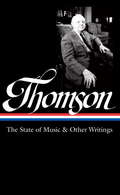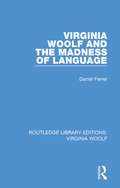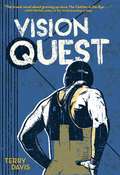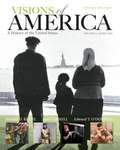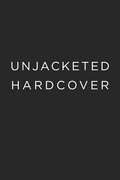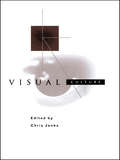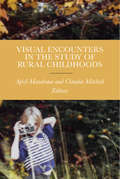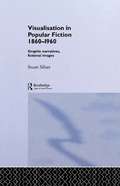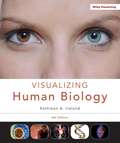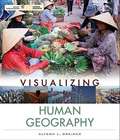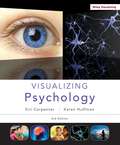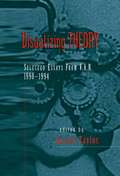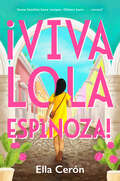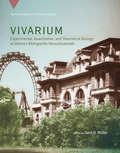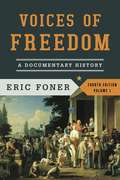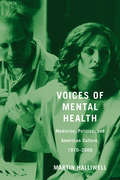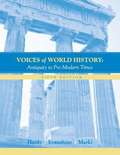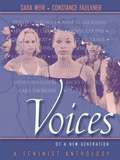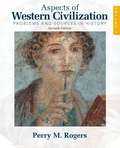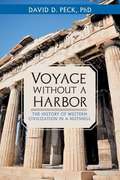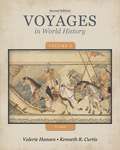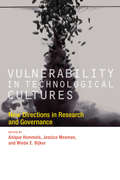- Table View
- List View
Virgil Thomson: Library of America #277
by Tim Page Virgil ThomsonAn unprecedented collection of polemical and autobiographical writings by America's greatest composer-critic. Following on the critically acclaimed 2014 edition of Virgil Thomson's collected newspaper music criticism, The Library of America and Pulitzer Prize-winning music critic Tim Page now present Thomson's other literary and critical works, a body of writing that constitutes America's musical declaration of independence from the European past. This volume opens with The State of Music (1939), the book that made Thomson's name as a critic and won him his 14-year stint at the New York Herald Tribune. This no-holds-barred polemic, here presented in its revised edition of 1962, discusses the commissions, jobs, and other opportunities available to the American composer, a worker in a world of performance and broadcast institutions that, today as much as in Thomson's time, are dominated by tin-eared, non-musical patrons of the arts who are shocked by the new and suspicious of native talent. Thomson's autobiography, Virgil Thomson (1966), is more than just the story of the struggle of one such American composer, it is an intellectual, aesthetic, and personal chronicle of the twentieth century, from World War I-era Kansas City to Harvard in the age of straw boaters, from Paris in the Twenties and Thirties to Manhattan in the Forties and after. A classic American memoir, it is marked by a buoyant wit, a true gift for verbal portrait-making, and a cast of characters including Aaron Copland, Gertrude Stein, James Joyce, Paul Bowles, John Houseman, and Orson Welles. American Music Since 1910 (1971) is a series of incisive essays on the lives and works of Ives, Ruggles, Varèse, Copland, Cage, and others who helped define a national musical idiom. Music with Words (1989), Thomson's final book, is a distillation of a subject he knew better than perhaps any other American composer: how to set English--especially American English--to music, in opera and art song. The volume is rounded out by a judicious selection of Thomson's magazine journalism from 1957 to 1984--thirty-seven pieces, most of them previously uncollected, including many long-form review-essays written for The New York Review of Books.From the Hardcover edition.
Virginia Woolf and the Madness of Language (Routledge Library Editions: Virginia Woolf #3)
by Daniel FerrerOriginally published in 1990, Virginia Woolf and the Madness of Language explores the relationship between madness and the disruption of linguistic and structural norms in Virginia Woolf’s modernist novels, opening new ground in Woolfian studies, as well as in psychoanalytic criticism. Focusing on Mrs Dalloway, The Waves, To the Lighthouse and Between the Acts, it investigates narrative strategies, showing that Woolf’s writings question their own origins and connection with madness and suicide. By combining textual analysis with an original use of autobiographical material, the books cause us to reconsider the full complexity of the articulation between an author’s life and work.
Virtual Clinical Excursions: Obstetrics-Pediatrics
by Marilyn J. Hockenberry David Wilson Kelly Ann Crum Patrick BarreraVirtual Clinical Excursions guides you through a virtual hospital setting where the patients are real and their conditions are constantly changing. Each lesson has a textbook reading assignment and activities based on "visiting" the patients in the hospital, which provide a perfect environment in which you may "practice" what you are learning.
Vision Quest
by Terry DavisFrom acclaimed author Terry Davis comes the cult classic, Vision Quest, which was called “the truest novel about growing up since The Catcher in the Rye” by New York Times bestselling author John Irving.Louden Swain is a high school wrestler who is working hard to cut his weight down. All he wants is to win his weight division in the state championships. But he’s distracted from his goals by the older girl with car trouble that is staying with his family for a while. He is quickly falling in love with her, but can Louden make a relationship work and reach his wrestling goals at the same time? Filled with integrity, honesty, and a sweetness that has made this coming-of-age story a cult classic, Vision Quest is a story that will be shared for generations to come.
Visions of America: A History of the United States, Volume Two (2nd Edition)
by Jennifer D. Keene Edward T. O'Donnell Saul T. CornellPraised by instructors and students alike, the first edition of Visions of America has brought history to life for a generation of visual learners-and has shown how competing visions of America have shaped our nation's past. We've made the second edition of this program even better by adding engaging new features and even easier access to new teaching resources.
Visions of Japanese Modernity: Articulations of Cinema, Nation, and Spectatorship, 1895-1925
by Aaron GerowGerow explores the processes by which film was defined, transformed, and adapted during its first three decades in Japan. He focuses in particular on how one trend in criticism, the Pure Film Movement, changed not only the way films were made, but also how they were conceived.
Visual Culture
by Chris JenksIn Visual Culture the 'visual' character of contemporary culture is explored in original and lively essays. The contributors look at advertising, film, painting and fine art, journalism, photography, television and propaganda. They argue that there is only a social, not a formal relation between vision and truth.
Visual Encounters in the Study of Rural Childhoods
by Claudia Mitchell Eric Gottesman Naydene De Lange Relebohile Moletsane April Mandrona Bernard Chan Karren Eppley Wendy Ewald Sally Campbell Galman Diana Carolina Gomez Helle Stranfaard Jensen Renee Jackson Rahul Kamble Irina Kosterina Jonathan Kremser Barbara Turk Niskac Sara Nyhlen Katarina Gritli Nygren Katja Gillander-Gadin Eva Soderberg Kelly Royds Beth Shively Jennifer Vanderburgh Sheilah Wilson Holley WlodarczykVisual Encounters in the Study of Rural Childhoods brings together visual studies and childhood studies to explore images of childhood in the study of rurality and rural life. The volume highlights how the voices of children themselves remain central to investigations of rural childhoods. Contributions look at representations and experiences of rural childhoods from both the Global North and Global South (including U.S., Canada, Haiti, India, Sweden, Slovenia, South Africa, Russia, Timor-Leste, and Colombia) and consider visuals ranging from picture books to cell phone video to television.
Visualisation in Popular Fiction 1860-1960: Graphic Narratives, Fictional Images
by Stuart SillarsVisualisation in Popular Fiction 1860-1960 explores the important but neglected tradition of illustrated fiction in English. It suggests new analytical approaches for its study by offering detailed discussions of a range of representative texts, including Mary Webb's Gone to Earth and Daphne du Maurier's Rebecca. Among the issues and genres Sillars explores are:* Victorian `narrative' paintings* Edwardian fictional magazines* comic strips * illustrated children's stories* the translation of novels into film An insightful and highly informative work, Visualisation in Popular Fiction will be of value to students of literature, cultural studies, visual art and film.
Visualizing Environmental Science (Third Edition)
by Linda R. Berg David M. Hassenzahl Mary Catherine HagerThe new third edition provides environmental scientists with an approach that focuses on visuals rather than excessive content. The streamlined coverage discusses the basic science so students walk away with a strong understanding of the facts. New Think Critically and Data Interpretation features encourage them to analyse visuals and graphs to place information in context. The illustrations have been improved and additional opportunities to conduct real data analysis have been added. The What a Scientist Sees feature also gives environment scientists a real-world perspective of how a concept or phenomenon is applied in the field.
Visualizing Human Biology
by Kathleen A. IrelandThis book includes many new features, additions, and visuals used to teach and explain. Varied learning styles are used through blogs, podcasts, animations and videos. Furthermore, box features highlight engaging stories that help maintain interest in the science behind the stories and connect what's relevant today with how human biology works. A new Visualizing Human Biology Lab Manual is fully compatible with the text, bringing the Visualizing approach into the laboratory setting.
Visualizing Human Geography: At Home in a Diverse World
by Alyson L. GreinerThis book provides environmental scientists with a better understanding of global human geography because of its visual approach. The narrative and concepts are tightly linked to visual elements, including practical examples that highlight the relevance of the concepts. Maps are integrated throughout to help reveal patterns or trends. Divergent views and critical thinking are emphasized. Photographs and other visuals are also included to reinforce the concepts. With this approach, environmental scientists will gain a strong foundation for thinking geographically as they develop the skills for interpreting and analyzing their world.
Visualizing Psychology, 3rd Edition
by Karen Huffman Siri CarpenterVisualizing Psychology 3rd Edition helps students examine their own personal studying and learning styles with several new pedagogical aids--encouraging students to apply what they are learning to their everyday lives while offering ongoing study tips and psychological techniques for mastering the material. Most importantly, students are provided with numerous opportunities to immediately access their understanding.
Visualizing Theory: Selected Essays from V.A.R., 1990-1994
by Lucien TaylorVisualizing Theory is a lavishly illustrated collection of provocative essays, occasional pieces, and dialogues that first appeared in Visual Anthropology Review between 1990 and 1994. It contains contributions from anthropologists, from cultural, literary and film critics and from image makers themselves. Reclaiming visual anthropology as a space for the critical representation of visual culture from the naive realist and exoticist inclinations that have beleaguered practitioners' efforts to date, Visualizing Theory is a major intervention into this growing field.
Viva Lola Espinoza
by Ella CerónA debut young adult novel that&’s Pride & Prejudice with a dash of magic, about a booksmart teen who spends the summer in Mexico City, meets two very cute boys, attempts to learn Spanish, and uncovers a family secret that changes her life forever.Lola Espinoza is cursed in love. Well, maybe not actually cursed — magic isn't real, is it? When Lola goes to spend the summer with her grandmother in Mexico City and meets handsome, flirtatious Rio, she discovers the unbelievable truth: Magic is very real, and what she'd always written off as bad luck is actually, truly . . . a curse. If Lola ever wants to fall in love without suffering the consequences, she'll have to break the curse. She finds an unlikely curse-breaking companion in Javi, a seemingly stoic boy she meets while working in her cousin's restaurant. Javi is willing to help Lola look into this family curse of hers, and Lola needs all the help she can get. Over the course of one summer — filled with food, family, and two very different boys — Lola explores Mexico City while learning about herself, her heritage, and the magic around us all.
Vivarium: Experimental, Quantitative, and Theoretical Biology at Vienna's Biologische Versuchsanstalt (Vienna Series in Theoretical Biology #19)
by Gerd MüllerThe scientific achievements and forgotten legacy of a major Austrian research institute, from its founding in 1902 to its wartime destruction in 1945.The Biologische Versuchsanstalt was founded in Vienna in 1902 with the explicit goal to foster the quantification, mathematization, and theory formation of the biological sciences. Three biologists from affluent Viennese Jewish families—Hans Przibram, Wilhelm Figdor, and Leopold von Portheim–founded, financed, and nurtured the institute, overseeing its development into one of the most advanced biological research institutes of the time. And yet today its accomplishments are nearly forgotten. In 1938, the founders and other members were denied access to the institute by the Nazis and were forced into exile or deported to concentration camps. The building itself was destroyed by fire in April 1945. This book rescues the legacy of the “Vivarium” (as the Institute was often called), describing both its scientific achievements and its place in history.The book covers the Viennese sociocultural context at the time of the Vivarium's founding, and the scientific zeitgeist that shaped its investigations. It discusses the institute's departments and their research topics, and describes two examples that had scientific and international ramifications: the early work of Karl von Frisch, who in 1973 won the Nobel Prize in Physiology or Medicine; and the connection to Cold Spring Harbor Laboratory in New York.ContributorsHeiner Fangerau, Johannes Feichtinger, Georg Gaugusch, Manfred D. Laubichler, Cheryl A. Logan, Gerd B. Müller, Tania Munz, Kärin Nickelsen, Christian Reiß, Kate E. Sohasky, Heiko Stoff, Klaus Taschwer
Voices Of Freedom: A Documentary History, Volume 1 (Fourth Edition)
by Eric FonerA rich collection of documentary voices addressing a central theme in American history--freedom. The documents in this collection show that although in some ways universal, the idea of freedom has never been a fixed, timeless concept with a single, unchanging definition. In fact, the history of the United States is in part a story of debates and struggles over freedom. Crises like the American Revolution, the Civil War, and the Cold War have permanently transformed the meaning of freedom. So too have demands by various groups of Americans for greater freedom. The primary-source selections in this book include presidential proclamations and letters by runaway slaves, famous court cases and obscure manifestos, prevailing ideas and dissenting ones. The voices range from Las Casas and Pontiac through Jefferson, Thoreau, Douglass, and Lincoln to Stanton, Sanger, Garvey, Luce, Byrd, and Obama. The Fourth Edition of Voices of Freedom includes new documents that better reflect the religious aspects of American history. It remains a comprehensive collection that offers a diverse gathering of authors and a wide breadth of opinion. Fully compiled and edited by Eric Foner, the collection includes headnotes and critical questions for each document. The book is organized as a companion to the textbook Give Me Liberty! An American History, Fourth Edition, by Eric Foner, and it can also be used with other texts in the American history survey and other courses.
Voices of Mental Health: Medicine, Politics, and American Culture, 1970-2000
by Dr Martin HalliwellThis dynamic and richly layered account of mental health in the late twentieth century interweaves three important stories: the rising political prominence of mental health in the United States since 1970; the shifting medical diagnostics of mental health at a time when health activists, advocacy groups, and public figures were all speaking out about the needs and rights of patients; and the concept of voice in literature, film, memoir, journalism, and medical case study that connects the health experiences of individuals to shared stories. Together, these three dimensions bring into conversation a diverse cast of late-century writers, filmmakers, actors, physicians, politicians, policy-makers, and social critics. In doing so, Martin Halliwell’s Voices of Mental Health breaks new ground in deepening our understanding of the place, politics, and trajectory of mental health from the moon landing to the millennium.
Voices of World History: Antiquity to Pre-Modern Times Fifth Edition
by B. Carmon Hardy Sharon K. Evanshine Mary MarkiHistory Textbook of the world from antiquity to pre-modern times.
Voices of a New Generation: A Feminist Anthology
by Sarah Weir Constance FaulknerA new generation of feminist thinkers from a variety of nonacademic and academic backgrounds including women's studies, anthropology, ethnic studies, and geography, address current issues in feminism. Weir and Faulkner (Western Washington U.) formed the anthology to provide their students with voices, viewpoints, and diversity missing from their regular textbooks. The 18 essays offer ways of understanding how younger women see themselves in the 21st century. Annotation ©2004 Book News, Inc., Portland, OR (booknews.com)
Volume 1: Problems And Sources In History
by Perry M. RogersThis reader is appropriate as a main text or a supplementary text for introductory-level survey courses in Western Civilization and European History and Civilization. Aspects of Western Civilization : Problems and Sources in History, Volume 1, 7/e, challenges students with basic questions regarding historical development, human nature, moral action, and practical necessity. This collection of diverse primary sources explores a wide variety of issues and is organized around seven major themes: the Power Structure, Social and Spiritual Values, the Institution and the Individual, Imperialism, Revolution and Historical Transition, the Varieties of Truth, and Women in History.
Voyage Without a Harbor: The History of Western Civilization in a Nutshell
by David D. PeckThis volume on Western civilization is designed to provide guidance and reliability at a fundamental level to help determine factual accuracy and relevance while navigating the proverbial mountains of information accessible today.
Voyages in World History: Volume I to 1600
by Valerie Hansen Kenneth R. CurtisThe authors of VOYAGES IN WORLD HISTORY never forget that history is made up of the stories of people. Each chapter of the text centers on a story--a traveler's account that highlights the book's main theme, the constant movement of people, goods, and ideas. The travelers include merchants, poets, rulers, explorers, soldiers, missionaries, and scholars, and their voyages provide a framework for each chapter that will draw you into the stories of world history. For the second edition of this text, the authors added broad global connections to every chapter, which will help you understand events in a larger context. VOYAGES IN WORLD HISTORY helps you make sense of the range of people, places, and events crucial to comprehension of world history.
Vulnerability in Technological Cultures: New Directions in Research and Governance (Inside Technology)
by Wiebe E. Bijker Jessica Mesman Anique HommelsAnalysis and case studies explore the concept of vulnerability, offering a novel and broader approach to understanding the risks and benefits of science and technology.Novel technologies and scientific advancements offer not only opportunities but risks. Technological systems are vulnerable to human error and technical malfunctioning that have far-reaching consequences: one flipped switch can cause a cascading power failure across a networked electric grid. Yet, once addressed, vulnerability accompanied by coping mechanisms may yield a more flexible and resilient society. This book investigates vulnerability, in both its negative and positive aspects, in technological cultures. The contributors argue that viewing risk in terms of vulnerability offers a novel approach to understanding the risks and benefits of science and technology. Such an approach broadens conventional risk analysis by connecting to issues of justice, solidarity, and livelihood, and enabling comparisons between the global north and south.The book explores case studies that range from agricultural practices in India to neonatal intensive care medicine in Western hospitals; these cases, spanning the issues addressed in the book, illustrate what vulnerability is and does. The book offers conceptual frameworks for empirical description and analysis of vulnerability that elucidate its ambiguity, context dependence, and constructed nature. Finally, the book addresses the implications of these analyses for the governance of vulnerability, proposing a more reflexive way of dealing with vulnerability in technological cultures.ContributorsMarjolein van Asselt, Martin Boeckhout, Wiebe Bijker, Tessa Fox, Stephen Healy, Anique Hommels, Sheila Jasanoff, Jozef Keulartz, Jessica Mesman, Ger Palmboom, C. Shambu Prasad, Julia Quartz, Johan M. Sanne, Maartje Schermer, Teesta Setelvad, Esha Shah, Andy Stirling, Imrat Verhoeven, Esther Versluis, Shiv Visvanathan, Gerard de Vries, Ger Wackers, Dick Willems
